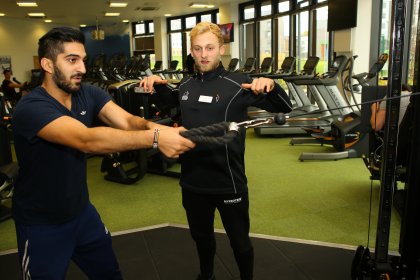1. Prioritise Efficient and Safe Movements
Sacrificing exercise technique to increase the weight utilised is commonplace in gyms across the world. However, poor exercise technique leads to lower force production, enhanced injury risk and often fails to recruit the targeted muscle groups. Nonetheless, it is key to remember that there is no such thing as perfect form; only the correct form for an individual. Our anatomy, mobility and flexibility essentially dictate how we move and vary from person to person.
There are some key points that be generalised when discussing exercise technique such as maintaining a neutral spine, reducing knee valgus/varus (knees falling in / out) and completing the movement through the optimal range of motion. If you are unsure how to perform a deadlift or even use the rowing machine with efficient and safe technique, find a HSV personal trainer and we will always be happy to help (unless it’s a Monday morning).
2. “No pain, no gain”
I don’t like pain, and I’m sure you don’t either. So this term “no pain, no gain”(NPNG) has been overused and is more or less always ill-advised. Why?
Well, as Janis touched on in last month’s tips (check them out if you have not had the chance yet) we are constantly harmonising our bodies across 4 bases of support. These are movement, stress, nutrition and recovery, if one of them gets knocked down or neglected it is more than likely that another one will follow in due course. So NPNG in my eyes should refer to the consistency required across our training, controlling our diet and ensuring we allow our body to recover, therefore “no consistency, no gain” would seem more appropriate but I can’t see that catching on… can you?
Now as Janis said previously, “Train smarter, not harder”; plan your sessions sensibly, constantly monitor you dietary intake and listen to your body. This is where a personal trainer can really benefit you, by working together to structure an individualised programme and chase down your goals.
3. The best diet is non-existant
Non-existent. Well at least in the long run. There may well be a tiny percent of the population that will attest to their “diets” being sustainable. However, we don’t need to be on a diet to improve athletic performance, reduce bodyfat or stack on some muscle mass.
The basic principle of any nutritional programme is calories - the units of energy in food. The foundation of weight management is the balance between calorie intake and expenditure. To lose weight you will need to be in a calorie deficit whereby your body utilises more energy than you consume. Likewise, to gain weight you will need to enter a calorie surplus, in which intake exceeds expenditure.
It really is that simple. Although, food composition (macro and micro nutrients), timing of consumption and many other factorsdo play a role in body composition, the biggest piece of the pie is the calorie balance. Unfortunately further depth into the aforementioned factors is beyond the scope of this post, but if you are interested in tracking your nutritional habits or having a more in-depth chat regarding weight management, pop down to our nutrition drop-in sessions on Monday at 6pm and Thursdays at 10am.
4. Measure your progression… or fail to progress
To reach any destination you will require a process, so the first step is to write down our process goals. These have to follow a well-founded protocol in order to be successful. The SCAMP protocol provides us with an easy to follow yet hugely effective goal planning strategy:
Specific – Determine factors that influence outcome and if the process you have outlined does not directly influence the goal it is not going to be the most effective method.
Challenging & Attainable– Possible but requires hard work, determination and consistency.
Measureable – Objective markers are used for process goals and can maintain adherence of a programme. Outcome goals require a time scale, and a value.
Personal – No instagram quotes, these have to be personal goals. You have to want it.
It amazes me how so few of the members do not set themselves any performance goals. Here is a quick example; on the first Monday of every month perform a plank for as long as you can. Time it, set a goal and see some progress.
5. “Real knowledge is to know the extent of one’s ignorance”
If you take anything away from this post let this be it. In the fitness industry, there is an array of reputable sources. Likewise there is a lot of… the opposite. The internet and in particular social media is full of scientific research, exercise guides and nutritional advice. So how do we filter out the pseudoscience and skip to the good bit?
It is hard, but you are lucky that amongst our staff at HSV we have UKSCA accredited coaches, first class sport science graduates and a wealth of experience. Ask as many questions as you like to our PTs and members alike, as the most experienced gym-goers were all beginners at some stage too.
So, I’ll end with one of my favourite figures, the Dunning-Kruger effect. Essentially this describes how our initial knowledge is powered purely by over-confidence. In the early stages of our careers (be that in business, exercise or anything!) we may perceive ourselves as a know-it-all. Then as you become more experienced you begin to accept that everyone has gaps in their knowledge and weaknesses. The real sign of expertise is to know the extent of one’s ignorance… and then work at this. i.e. Accept your flaws and get them sorted!

